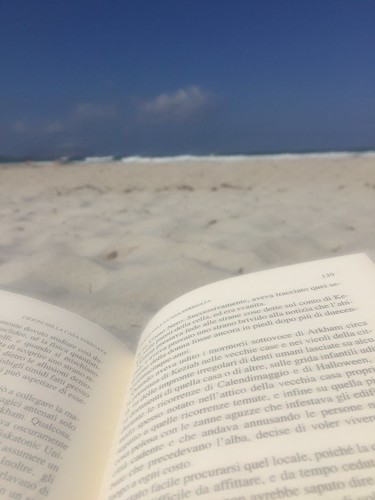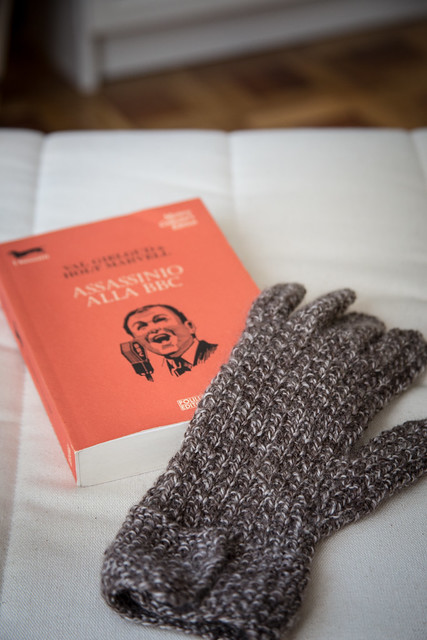The bookshop "Mercurio" is one of my favorite spot in Torino: I was really amazed by it when it opened, many years ago by now.
"What? Opened till midnight? Seriously!?!?"
Nowadays we're used to shops being always open, to supermarket working 24/7 but this was different: it was a time when shops being opened on a Sunday afternoon were one-off special events and, there it was, a shop open until late, a shop open when all the other shops were closed.
And above all it wasn't a chain store, but an independent shop. And it was an independent book shop!
You might think it's a small shop but that's an illusion: once you step in you realize how wrong you are; down the rabbit hole there's a corridor, stuck with books on one side and cards, postcards and other stationery on the opposite wall, and at the end of it there is another room. Then, at the end of the room a set of stairs takes you upstairs. Or you can turn right into the other room for kids literature.
There are many things I love about Mercurio: the fact that the booksellers know about books is a winning factor. I stopped taking for granted the knowledge of booksellers when, in a big chain bookstore branch, the shop assistant asked me how to spell Stephen King.
I like that they store books that are not so easy to find in other bookstores, like books about sewing patterns or about Japanese anime. They have a massive stack of photography books, a small but heavyweight section dedicated to Torino, the standard set of classics, travel guide, popular paperback and then they always got something on offer.
I never purposely plan to go and visit the shop, yet, every time I'm in town, I somehow find myself turning into via Po from Piazza Castello thinking that "
Oh well, I got up to here anyway and it's less than 50 meters away... Let's go and have a look at Mercurio"
And that's exactly what happened about 1 month ago. I was looking for a book for a friend, but my attention got completely sidetracked by a big display of a book series by a publishing house I (shamefully so) never heard of before,
Polillo Editore: the covers were all salmon pink and the name of the series is "I bassotti" (The dachshunds). I found hte name of the collection and its logo so cute, I didn’t really stop to wonder why they linked this dog to a collection of crime fiction, but at that moment I couldn’t really be bothered by it. There was a whole array of books with a special price tag flashing in front of me and the first title my eyes fell on to was
Freeman Wills Crofts’s “
The 12:30 from Croydon”
Croydon! There’s something more than Ikea in Croydon, I know... and I know that one of those things is the airport (I remember watching a documetary about it).
Not so long story even shorter, I bought the novel and ready it in less than a week. I just couldn’t put the book down. The inverted detective story and the translation just got me hooked and made me miss my metro stop more than once.
I once more found myself by pure chance in front of Mercurio on my next visit back home. Pure chance, nothing planned, but well… I was there already, why not going in to check if the offer on Bassotti was still going on? Yeah!
I just wanted to have a look at the bookshope once more, what’s wrong with it? What’s wrong is the fact that I’m not a big fan of crime fiction unless it’s from the golden age of crime fiction and “ I bassotti” is a book series focused solely on American and British novel from the golden age of crime fiction.
So, I was not that surprised I left the bookshop with a new book in my bag, “Death at Broadcasting House” by
Val Gielguld and
Holt Marvel.
It took me a bit longer to finish this one, because I was trying to finish knitting a pair of gloves. And because (spoiler alert!) a pair of gloves plays a big part in this novel, it seemed like a sign that I should continue knitting and reading at the same time.
Well, it’s not easy: it’s very complicated; knitting and reading are not the best pair of activities you want to try for multitasking.
At the end of it, I finished reading the novel, finished one of the gloves, and learnt how to turn pages using my right foot (still debating whether adding it as skill on Lindkedin: curious how many people will endorse me for it). I've also learnt that the consequent backache is not an experience I want to repeat in the near future.
I finished the book this week and I already miss it: the things I enjoyed the most are how smoothly it flows, the description of the characters and the description of a London that is no more. I used to work in Soho, my beloved tattoo shop is in Soho and it is so fascinating to read of an area htat I know but not that has changed so dramatically since the time the book was written.
I think that authors being so knowledgeable about how BBC worked at the time helped them a lot.
I found myself wishing a movie could be made out of it, because in my head I could picture contemporary actors in the different roles, yet at the same time being afraid of it, because I don’t really want this small universe I built inside my head to be crushed by the constraints imposed by modern movie productions on screenplay and directorial choices.
I was very happy (and relieved) to find out that a
movie was actually made out of the novel the same year the book was published. Moreover Val Gielgud plays one of the main character.
And guess what? It’s available on DVD...




